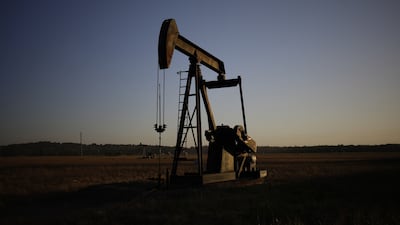Oil prices settled lower on Friday amid fears of a banking contagion and comments from a US energy official weighing on the outlook for crude demand.
However, oil futures notched weekly gains after recording losses of 12 per cent the week prior on fears of a fresh financial crisis spurred by a banking crisis in the US.
Brent, the benchmark for two thirds of the world’s oil, closed 1.21 per cent lower at $74.99 a barrel on Friday, while West Texas Intermediate, the gauge that tracks US crude, settled one per cent lower at $69.26 a barrel.
The drop in prices on Friday came after European banking shares slumped amid crisis fears.
Shares of Deutsche Bank, Germany's largest bank, plunged more than 12 per cent after a sharp rise in the cost of insuring the financial institution's bonds against the risk of default.
In response to the stock price fall, German Chancellor Olaf Scholz said on Friday that the bank was still profitable, and that there was no cause for concern regarding its future.
“Deutsche Bank has thoroughly reorganised and modernised its business model and is a very profitable bank," Mr Scholz was quoted as saying by agencies during a news conference in Brussels.
Meanwhile, US Energy Secretary Jennifer Granholm said that refilling the country's Strategic Petroleum Reserve could take several years.
A record 180 million barrels of oil were released from America’s emergency reserve over the past year after Russia’s invasion of Ukraine resulted in Brent crude surging close to a 14-year high of $140 per barrel.
In December, the US Department of Energy said it would replenish the reserves, starting with a purchase of three million barrels of crude.
“Crude oil shortly spiked above the $70 mark but saw decent resistance at this level given that the financial stress seriously deteriorated global growth prospects and demand outlook,” said Ipek Ozkardeskaya, a senior analyst at Swissquote Bank.
Brent posted its biggest declines in months last week following the collapse of Silicon Valley Bank and Signature Bank in the US and a crisis at Switzerland's Credit Suisse, which resulted in the bank’s acquisition by larger rival UBS in an emergency rescue deal.
On Wednesday, the US Federal Reserve raised interest rates by a quarter of a percentage point, stressing that the US banking system was “sound and resilient.”
US crude stock data also showed an increase of 1.1 million barrels last week, compared with analysts' expectations of a 1.7 million barrel decrease, indicating lower demand in the world’s largest economy.
“Banking turmoil will clearly have a negative impact on the economy, possibly crushing small businesses as lending becomes more difficult,” said Ed Moya, a senior market analyst at Oanda.
"There just isn't a lot of optimism here for the outlook over the short-term for crude oil and that has energy traders hesitant to buy this dip."
The recent drop in prices does not reflect oil market fundamentals, given strong crude consumption in Asia and the continued economic recovery in China, the world’s top crude importer, according to analysts.
The International Energy Agency expects global oil demand to rise “sharply” this year amid a rebound in air traffic and pent-up Chinese demand.
Oil demand growth will “accelerate” to 2.6 million barrels per day in the final three months of this year, from 710,000 bpd in the current quarter, the agency said in its February report.
Goldman Sachs has reduced its oil price forecasts for 2023, citing growing crude supplies and lower demand.
The investment bank now expects Brent to trade at $94 a barrel for the 12 months ahead and at $97 in the second half of 2024.
It had previously projected that the benchmark would trade at $100 in both scenarios.

